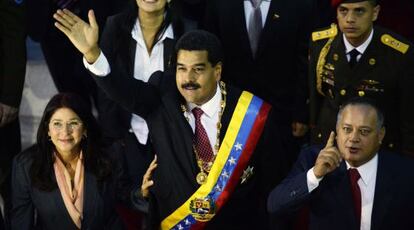Venezuelas Maduro formally asks lawmakers for broader powers
Opposition tells Venezuelans to reject petition if the request doesn’t follow the Constitution President explains he needs to govern by decree to fight corruption and cure economic woes

Venezuelan lawmakers on Wednesday began debating a special petition made by President Nicolás Maduro who the night before asked the National Assembly to grant him special powers to govern by decree.
In an address on Tuesday, Maduro explained that he needed the right to make quick decisions to fight corruption and “transform he economy.” But it is a move that the opposition believes will lead to persecution of its members.
“We have to break the barrier of no-return for the revolution’s cause,” Maduro said in a fiery address, quoting from his mentor and predecessor, the late Hugo Chávez.
With just six months in office, Maduro is asking for “special powers” for one year. He didn’t give any details of what laws he intends to enact during this period or in what areas except to mention that they were geared to make changes in the economy and introduce “new ethics in politics.”
Venezuelans are currently facing a tough period as they grapple with high inflation listed at more than 32 percent, hard currency shortages and lack of essential foodstuffs and consumer items such as fresh chicken and toilet paper. In the past, the president has attacked business leaders for creating the shortages.
During his nearly three-hour address, Maduro attacked what he called the “rightwing bourgeois” who he said controls the media and “70 percent of the country’s revenue” that comes from the petroleum industry.
The state-owned Petroleos de Venezuela (Pdvsa) has been opening the doors in recent months to private sector investment through joint ventures with other oil companies abroad, according to analysts.
Maduro needs three-fifths, or 99 of the 165 members, of National Assembly to get the enabling law passed. But the ruling United Socialist Party of Venezuela (PSUV) and its allies are short with 98 seats.
Opposition leader Henrique Capriles, who is governor of Miranda state, said that none of the deputies from the Unified Democratic Panel (MUD) will vote in favor of his petition.
“I call on all Venezuelans to reject this enabling law if it is passed without the necessary votes and without what has been established in the Constitution [the three-fifths majority],” Capriles said.
Last week, Attorney General Luisa Ortega Díaz asked the Supreme Court to open pre-trial proceedings for impeachment against National Assembly member María Mercedes Aranguren — a lawmaker who jumped from the PSUV in 2011 to join a smaller party in the MUD coalition. Some analysts, as well as the opposition, believe that it is a ploy to get Aranguren’s alternate to take her place in the hopes he will swing back to the PSUV’s side.
Tu suscripción se está usando en otro dispositivo
¿Quieres añadir otro usuario a tu suscripción?
Si continúas leyendo en este dispositivo, no se podrá leer en el otro.
FlechaTu suscripción se está usando en otro dispositivo y solo puedes acceder a EL PAÍS desde un dispositivo a la vez.
Si quieres compartir tu cuenta, cambia tu suscripción a la modalidad Premium, así podrás añadir otro usuario. Cada uno accederá con su propia cuenta de email, lo que os permitirá personalizar vuestra experiencia en EL PAÍS.
¿Tienes una suscripción de empresa? Accede aquí para contratar más cuentas.
En el caso de no saber quién está usando tu cuenta, te recomendamos cambiar tu contraseña aquí.
Si decides continuar compartiendo tu cuenta, este mensaje se mostrará en tu dispositivo y en el de la otra persona que está usando tu cuenta de forma indefinida, afectando a tu experiencia de lectura. Puedes consultar aquí los términos y condiciones de la suscripción digital.








































